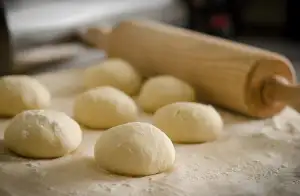Perfectly Soft Boiled Eggs: Unveiling the Ideal Cooking Time for a Delicate Delight

- Importance of timing in achieving the perfect soft-boiled egg
- Factors that affect the cooking time of soft-boiled eggs
- Step-by-step guide on how to soft-boil an egg
- Boiling water and adding the eggs
- Setting the timer for the desired consistency
- Preparing an ice bath for immediate cooling
- Recommended cooking times for different levels of softness
- Soft-boiled with a runny yolk
- Soft-boiled with a slightly set yolk
- Soft-boiled with a fully set yolk
- Tips and tricks for achieving the perfect soft-boiled egg
Soft-boiled eggs are a culinary delight, offering a delicate balance between the firmness of a hard-boiled egg and the tenderness of a poached egg. With their smooth, velvety texture and creamy yolk, soft-boiled eggs are a versatile ingredient that can be enjoyed on their own or used as a topping for salads, toast, or even ramen. The key to achieving the perfect soft-boiled egg lies in mastering the cooking time, which requires precision and attention to detail. In this article, we will delve into the art of cooking soft-boiled eggs and unveil the ideal cooking time for this delightful dish.
Importance of timing in achieving the perfect soft-boiled egg
Timing is crucial when it comes to achieving the perfect soft-boiled egg. The difference of just a few seconds can mean the distinction between a silky, runny yolk and an overcooked disappointment. The ideal cooking time allows for a delicate balance between the firmness of the white and the creaminess of the yolk, resulting in a delightful textural contrast that is truly irresistible. Mastering the art of timing is key to unlocking this culinary delight and elevating your breakfast or brunch experience to new heights.
Factors that affect the cooking time of soft-boiled eggs
Factors such as egg size, starting temperature, and altitude can affect the cooking time of soft-boiled eggs. Larger eggs will require more time to cook than smaller ones. Eggs that are at room temperature will cook faster than those straight from the refrigerator. Altitude also plays a role, as higher altitudes require longer cooking times due to lower boiling points. It is important to consider these factors when determining the ideal cooking time for a perfectly soft-boiled egg.
Step-by-step guide on how to soft-boil an egg
a. Start by bringing a pot of water to a rolling boil. Make sure the pot is large enough to hold the eggs comfortably.
b. Gently lower the eggs into the boiling water using a spoon or tongs. Be careful not to drop them, as this could cause them to crack.
c. Set a timer for the desired consistency of your soft-boiled egg. For a runny yolk, cook for 4-5 minutes. For a slightly set yolk, cook for 6-7 minutes. And for a fully set yolk, cook for 8-9 minutes.
d. While the eggs are cooking, prepare an ice bath by filling a bowl with cold water and adding ice cubes.
e. Once the timer goes off, carefully remove the eggs from the boiling water using a slotted spoon and immediately transfer them to the ice bath. This will stop the cooking process and help cool them down quickly.
f. Let the eggs sit in the ice bath for at least 1 minute to ensure they are fully cooled and easier to handle.
g. Gently tap each egg on a hard surface to crack the shell, then peel it off starting from the wider end where there is usually an air pocket.
h. Your perfectly soft-boiled egg is now ready to be enjoyed! Serve it with toast soldiers or use it as a topping for salads or rice bowls.
Remember, practice makes perfect when it comes to achieving your preferred level of softness in a soft-boiled egg. Don't be afraid to experiment with different cooking times until you find your ideal consistency.
Boiling water and adding the eggs
To begin the process of cooking a soft-boiled egg, start by bringing a pot of water to a rolling boil. Make sure there is enough water in the pot to fully submerge the eggs. Gently lower the eggs into the boiling water using a spoon or tongs to prevent any cracks. Be careful not to overcrowd the pot, as this can affect the cooking time and consistency of the eggs. Once all the eggs are in the pot, reduce the heat slightly to maintain a gentle boil.
Setting the timer for the desired consistency
Once the eggs are in the boiling water, it's crucial to set a timer for the desired consistency. The cooking time will vary depending on how soft or firm you want the yolk to be. For a soft-boiled egg with a runny yolk, set the timer for 4-5 minutes. If you prefer a slightly set yolk, aim for 6-7 minutes. And if you like your yolk fully set, cook the eggs for around 8-9 minutes. Remember that timing is key to achieving the perfect texture and consistency of your soft-boiled eggs.
Preparing an ice bath for immediate cooling
Preparing an ice bath for immediate cooling is a crucial step in achieving the perfect soft-boiled egg. Once the desired cooking time is reached, it's important to stop the cooking process immediately to prevent overcooking. To create an ice bath, simply fill a large bowl with cold water and add a generous amount of ice cubes. The ice bath will rapidly cool down the eggs and halt the cooking process, ensuring that they remain at the desired level of softness. Gently place the cooked eggs into the ice bath and let them sit for about 1-2 minutes. This quick cooling method will help preserve the delicate texture of the whites while keeping the yolk perfectly creamy and luscious.
Recommended cooking times for different levels of softness
a. Soft-boiled with a runny yolk: For a delightfully gooey center, cook the egg for 4-5 minutes.
b. Soft-boiled with a slightly set yolk: Cook the egg for 6-7 minutes to achieve a creamy yet firm yolk.
c. Soft-boiled with a fully set yolk: For a firmer texture, cook the egg for 8-9 minutes until the yolk is completely set.
Soft-boiled with a runny yolk
Soft-boiled with a runny yolk is the epitome of perfection for many egg enthusiasts. The creamy, golden yolk oozes out when the delicate shell is cracked open, creating a luxurious and indulgent experience. To achieve this level of softness, the ideal cooking time ranges from 4 to 5 minutes. However, it's important to note that the exact timing may vary depending on factors such as egg size and starting temperature. Experimentation is key to finding your preferred consistency. So, whether you enjoy dipping toast soldiers or drizzling the yolk over a salad, a soft-boiled egg with a runny yolk is sure to elevate any dish to new heights of deliciousness.
Soft-boiled with a slightly set yolk
Soft-boiled with a slightly set yolk offers the perfect balance between a runny and fully set yolk. To achieve this level of doneness, cook the eggs for approximately 5 to 6 minutes. This will result in a creamy and custard-like texture that is still slightly liquid in the center. The whites will be fully cooked, providing a delicate contrast to the soft yolk. This level of softness is ideal for those who enjoy a more substantial yolk but still want some creaminess in their egg. Serve with toast soldiers for dipping and savor the delightful combination of textures and flavors.
Soft-boiled with a fully set yolk
Soft-boiled eggs with a fully set yolk are perfect for those who prefer a firmer texture. To achieve this level of doneness, the cooking time should be slightly longer than for a slightly set yolk. Typically, this would require boiling the eggs for around 7-8 minutes. The extended cooking time allows the yolk to fully solidify while still maintaining a soft and tender white. Once cooked, immediately transfer the eggs to an ice bath to halt the cooking process and ensure they are easy to peel. These fully set soft-boiled eggs are versatile and can be enjoyed on their own or used in various recipes like salads or sandwiches.
Tips and tricks for achieving the perfect soft-boiled egg
1. Use eggs at room temperature: Cold eggs straight from the fridge can result in uneven cooking. Letting them come to room temperature ensures a more consistent cook.
2. Pierce the eggshell: Before boiling, gently pierce the wider end of the egg with a pin or needle. This helps prevent cracking during cooking and allows steam to escape, resulting in a smoother texture.
3. Experiment with cooking times: Every stove and pot is different, so it may take some trial and error to find your ideal cooking time. Start with the recommended times and adjust accordingly to achieve your desired consistency.
4. Use a timer: Timing is crucial when it comes to soft-boiled eggs. Set a timer as soon as you add the eggs to the boiling water to ensure precision and avoid overcooking.
5. Prepare an ice bath: To stop the cooking process immediately and prevent further carryover cooking, have an ice bath ready before removing the eggs from boiling water. Plunge them into cold water for a few minutes until they are completely cooled.
6. Peel under running water: Soft-boiled eggs can be delicate, making peeling challenging at times. To make it easier, peel them under running water or in a bowl of water, which helps loosen the shell and prevents damage to the tender egg white.
By following these tips and tricks, you'll be well on your way to achieving perfectly soft-boiled eggs every time. Enjoy this simple pleasure that brings both comfort and satisfaction to any meal!
In conclusion, mastering the art of cooking a perfectly soft-boiled egg is a skill that can bring immense satisfaction to any culinary enthusiast. The delicate balance between timing and technique is crucial in achieving the desired consistency and texture.
By understanding the factors that affect cooking time and following a step-by-step guide, anyone can create a soft-boiled egg that is just right for their taste preferences. Whether it's a runny yolk that oozes out when cut into or a slightly set yolk that offers a creamy richness, there is a perfect softness for everyone.
Remember to experiment with different cooking times to find your ideal level of doneness. And don't forget to use fresh eggs for the best results! With practice and patience, you'll soon be able to enjoy the simple pleasure of cracking open a perfectly cooked soft-boiled egg and savoring its delicate delight.
Published: 13. 02. 2024
Category: Recipes



